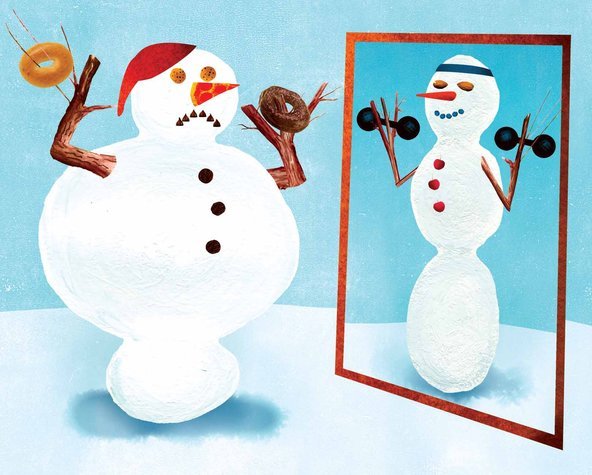How to Lose Weight During Winters

Seasonal weight gain varies from person to person, but certain phenomena during the holiday season tend to tip the scales in a less desirable direction for most. Surveys show people tend to gain five to seven pounds on average during the winter months, according to Lawrence J. Cheskin, MD, founder, and director of the Johns Hopkins Weight Management Center as reported by WebMD.
It is rather depressing to leave work and it already is totally dark outside. But it's not all in your head; the lack of sunlight in the winter can actually have a significant effect on your mood and health. A handful of people develop Seasonal Affective Disorder (SAD) in the winter, which is a type of clinical depression. Smith recommends making a concerted effort to wake up in the morning and take advantage of the sunlight in the morning to counteract the lack of exposure in the evening.
Winter makes your body to accumulate more fat-rich food to keep you warm. This is mostly because of the evolutionary instinct of all animal kingdoms, which humans are also a part of. Blaming evolution for the extra pounds you gained during winter, however, is not a very healthy practice. You can avoid eating in an unhealthy fashion during winter by focussing on certain simple factors.
In the below section we will try to provide you with some tips that can help you get through this winter without putting on extra weight.
Make Sure you Stay Clear of too Much white Food:
White foods are basically comforting food that is high in carbohydrate content. Food like rice, bread, cookies, cake, and pasta are things that you might crave during extreme winter. Refined food like these is easy to digest and contains a lot of sugar. This can cause insulin levels to spike at a swift pace which can cause a lot of health issues.
Halloween, Thanksgiving, Christmas, Hannukah- you name it, most holidays revolve around food and the majority of them give special attention to dessert. The key here is to analyse your options and settle on one that you really can't live without.
Alternatively, you can try and replace this craving by eating wholesome grains, fruits, and vegetables that way you can be safe from the dangers of these high sugar foods.
Wholegrain foods like quinoa, brown rice, oats, brown bread, and wholegrain pasta can help in keeping you full at the same time keeping you away from health issues like diabetes during winter.
Drink Water without Fail:
Winter makes your body sweat less which eliminates thirst for a long time. However, it’s important that you consume at least two litres of water a day during winter to stay healthy and to stay away from problems including UTI’s (Urinary Tract Infections) and kidney problems. In winters people tend to use air-conditioners and room heaters more often than in other seasons. Using air conditioners and space heaters more often can also dehydrate your body a lot and this makes drinking water more important.
If you are looking for a flavor-filled hot drink during winter you can always opt for herbal teas, herbal teas have enough water content in them and are loaded with anti-oxidants that can help in maintaining a healthy body weight during winters. Opting for green tea or chamomile tea is a very good practice that can help you survive this winter without causing many health issues.
Ensure Daily Protein Intake:
During winters as you stay away from fat-rich foods, it’s also important that you include items in your diet that are rich in protein. Sufficient protein intake will ensure that you will be able to maintain healthy body weight during winter. Protein-rich foods have a comparatively low GI content that will help you in maintaining a healthy blood sugar level and will also ensure that you have a healthy and pleasant winter. Sufficient protein intake will also make sure that you feel full with just a little food and this will help in preventing you from grabbing more sugar-rich food.
Protein-rich food items such as nuts, chicken, lamb, lean meat, eggs, fish, low-fat dairy products, soy-based products, etc. are some of the best options to replace fat in your daily diet. Having enough protein during winter is therefore very important.
Consume more Fruits and Vegetables
Consuming a lot of fruits and vegetables is yet another important factor to take care of during winter. Fresh fruit will ensure that you are supplied with enough sources of essential vitamins and minerals during winter to ensure that your immune system remains strong. Especially in India, winter comes with a barrage of seasonal diseases and it’s important to have a healthy immune system fight against these diseases.
Also, do take care that you do not overeat high GI vegetables like a potato if you are not trying to gain a lot of weight during this winter.
Losing weight during winter might look like a hard task to accomplish in the beginning. The fact that wintertime pushes us to eat more and attain more fat makes this more challenging. Attaining weight loss during winter can only be attained with utmost dedication and commitment. Most often people get confused as to what diet to follow to lose weight and at the same time have enough energy to survive the winter.
Gaining weight during winter may seem like a fairly easy task given the fact that eating more comes naturally during winter. However, uncontrolled munching is not the scientific way to gain a healthy weight during winter.
Diet plans tend to change if you are someone who hits the gym regularly. You cannot follow a healthy winter diet plan if you are not counting the extra calories you burn at the gym. People who go for regular workouts must make sure that their diet plan is inclusive of all their nutrition needs. Usually, most bodybuilders seek to add some extra pounds of muscle by taking advantage of the season.
However, you should be careful while choosing your diet plan as it’s very crucial that it meets all your energy demands and not exceed them. Here are a few of the dietary recommendations:
Oatmeal
Nothing beats a hot bowl of oatmeal in the winter. Not only is oatmeal tasty and convenient, but it is also full of nutrients and phytochemicals. It also keeps you full and provides lasting energy. According to one study, people who eat oats for breakfast consume one third fewer calories at lunch.
Guava
Guava is a tropical fruit that tastes similar to pears and strawberries. It contains five times more vitamin C than an orange and is rich in fiber- especially if you eat the seeds. Guava also contains lutein, potassium, soluble dietary fiber, calcium, and iron. The best part? It only has 60 calories in one serving, making it the perfect slimming snack.
Pomelo
This citrus fruit looks like a large grapefruit with thick bark. Sweeter than grapefruit, its yellow flesh is loaded with antioxidants that help prevent the spread of cancer cells. It is also rich in folic acid and potassium.
Sunflower Seeds
Sunflower seeds are an excellent source of vitamin B, protein, and folate. They also help protect the immune system. They are loaded with vitamin E, an antioxidant that prevents cell damage supports healthy skin and hair, and can even prevent cancer.
Honey
Honey is the most natural sweetener you can find. But be careful not to overdo it – at equal volume, it contains more calories than sugar. It is a good source of antioxidants and its antimicrobial properties make it an ally during the winter.
Macadamia Nuts
Macadamia nuts are a melt-in-your-mouth treat, known for their health benefits. They are full of monounsaturated fatty acids (good fats) and may help reduce cholesterol. They are also rich in vitamin E and antioxidants and contain omega-3 and omega-6 in a ratio of about 1 to 1, which is great.
Prickly Pears
Also called pear cactus, this fruit has a vibrant ruby red and golden pulp that is soft and sweet (like a cross between watermelon and lemon). Each fruit is richer in magnesium than an orange, an apple, and a pear combined. A study published in 2009 in the American Journal of Clinical Nutrition, which included more than 64,000 women, found that when magnesium intake increases, the risk of type 2 diabetes falls.
Coconut Milk
Research suggests that the fatty acids present in coconut milk can help speed up your metabolism and even promote weight loss. Read labels- some brands are very high in calories. In addition, its dietary fiber will keep you feeling full.
Chia Seeds
Chia seeds pack a huge nutritional punch. It contains large quantities of iron, folate, calcium, magnesium, and omega 3. Its soluble fiber increases the duration of satiety. Add them to a smoothie for a healthy start to your day.
Dark Chocolate
Losing weight can be impossible if your diet is too restrictive. Rich and decadent dark chocolate in small amounts can satisfy your craving for sweets without consuming too many calories. In addition, you will benefit from its antioxidants.
According to The New England Journal of Medicine study mentioned before, most people don't actually lose most of the weight they put on during the holidays- which can mean packing on the pounds after a few years have ticked by. Rather than fight off your cravings, keep healthy snacks stocked in your desk drawer and allow yourself to have a treat every now and then.
Losing weight is difficult, no matter what time of the year it is. It seems like it is a more challenging task during those cold, winter months. There’s less daylight, the weather is cloudy and chilly, and clothing tends to cover up more of our body’s surface area. People lose their motivation once the winter weather rolls in, more content to cuddle up under a blanket on the couch than make a trip to the gym. With all the mentioned tips and a helping hand, we hope to give you a little nudge to beat the winters with your heat!















































